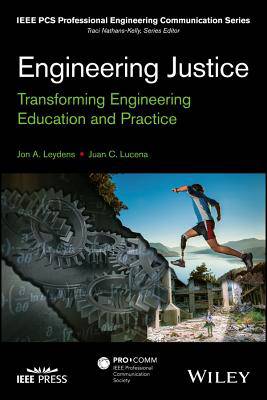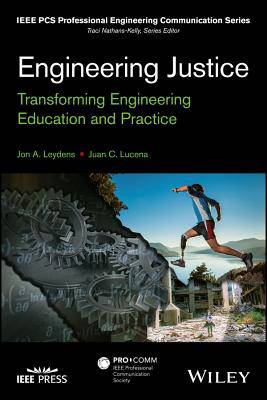
- Afhalen na 1 uur in een winkel met voorraad
- Gratis thuislevering in België vanaf € 30
- Ruim aanbod met 7 miljoen producten
- Afhalen na 1 uur in een winkel met voorraad
- Gratis thuislevering in België vanaf € 30
- Ruim aanbod met 7 miljoen producten
Omschrijving
Shows how the engineering curriculum can be a site for rendering social justice visible in engineering, for exploring complex socio-technical interplays inherent in engineering practice, and for enhancing teaching and learning
Using social justice as a catalyst for curricular transformation, Engineering Justice presents an examination of how politics, culture, and other social issues are inherent in the practice of engineering. It aims to align engineering curricula with socially just outcomes, increase enrollment among underrepresented groups, and lessen lingering gender, class, and ethnicity gaps by showing how the power of engineering knowledge can be explicitly harnessed to serve the underserved and address social inequalities. This book is meant to transform the way educators think about engineering curricula through creating or transforming existing courses to attract, retain, and motivate engineering students to become professionals who enact engineering for social justice.
Engineering Justice offers thought-provoking chapters on: why social justice is inherent yet often invisible in engineering education and practice; engineering design for social justice; social justice in the engineering sciences; social justice in humanities and social science courses for engineers; and transforming engineering education and practice. In addition, this book:
- Provides a transformative framework for engineering educators in service learning, professional communication, humanitarian engineering, community service, social entrepreneurship, and social responsibility
- Includes strategies that engineers on the job can use to advocate for social justice issues and explain their importance to employers, clients, and supervisors
- Discusses diversity in engineering educational contexts and how it affects the way students learn and develop
Engineering Justice is an important book for today's professors, administrators, and curriculum specialists who seek to produce the best engineers of today and tomorrow.
Specificaties
Betrokkenen
- Auteur(s):
- Uitgeverij:
Inhoud
- Aantal bladzijden:
- 304
- Taal:
- Engels
- Reeks:
Eigenschappen
- Productcode (EAN):
- 9781118757307
- Verschijningsdatum:
- 18/12/2017
- Uitvoering:
- Hardcover
- Formaat:
- Genaaid
- Afmetingen:
- 152 mm x 231 mm
- Gewicht:
- 544 g

Alleen bij Standaard Boekhandel
Beoordelingen
We publiceren alleen reviews die voldoen aan de voorwaarden voor reviews. Bekijk onze voorwaarden voor reviews.











